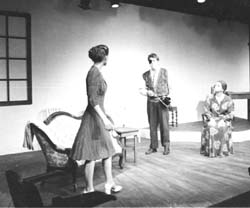|
News
|
|
|
Perspectives
|
|
|
Arts
|
|
|
Sports
|
|
|
Other
|
|

Lucia Mad: Crazed Love In The Joyce Household
Little Theatre Presents Literary Romance Tonight
by Michael Barthel

|
|
Portrait of the Artist as a Wizened Writer: Levine-Smith (l), Van Winkle, and Benedict-Mercer. (photo by Alyssa Tomasi) |
It's hard to think of genius Irish playwright Samuel Beckett as a love interest. Neither the real-life nor theatrical Beckett, portrayed extremely well here by senior Aaron Bonner-Jackson, can be readily envisioned in a beefcake, shirtless pose, his insolent chest muscles rippling as he clutches a flaxen-haired virgin. Nevertheless, Don Nigro's Lucia Mad, directed by Gabriel Carleton-Barnes, is basically a love story between Beckett and Lucia Joyce, the daughter of James Joyce, played by sophomore Vanessa Levine-Smith.
It is, of course, much more than that. Based on actual events - when Beckett served as Joyce's secretary - it explores Joyce's relationships with his family and his art, the role of wives and daughters, and Beckett's struggle to be human, all with a great deal of humor and thankfully little of the kind of windy philosophizing that characterizes Tom Stoppard's Travesties, which similarly deals with a fictional Joyce.
The play opens with cross-monologues between Lucia and Beckett, with the wizened author complaining of excretory problems from a wheelchair (sample line: "I have an anal cyst." Trust me, it's funny). The scene quickly shifts to the first meeting between Joyce (junior Matthew Van Winkle), and Beckett. Bonner-Jackson skillfully weaves the elderly mannerisms into the demeanor of a nervous young man meeting his idol. The way he handles his hat is particularly effective, as is the way he licks his lips during the initial, awkward seduction attempt by Lucia. The scenes between Bonner-Jackson and Van Winkle are always rewarding, and while Levine takes a while to settle into her role, she ultimately captures the kind of twisted sensuality Lucia's character requires.
Lucia eventually tricks Beckett into proposing to her, but he works up the courage to break it off, in the process scarring and perhaps breaking her. Joyce shields his daughter in her willing procession into madness and fights with his wife Nora (sophomore Ruth Benedict Mercer) over the proper course of treatment. Jung (first-year Thomas Taylor) offers Joyce a kind of epiphany and has Lucia institutionalized. The play ends with two heart-wrenching, masterfully acted scenes of reconciliation and inevitable loss.
It's hard to talk about this play as a whole and really emphasize the humor, but there is a constant stream of wonderfully funny bits, exchanges and quips. Beckett's opening monologue concerning his mother's profession is certainly one, as is the memorable speech by Tom McGreevy, also played by Taylor, in the should-be silence after Beckett breaks off his engagement, and a virtuoso cameo by Napolean (sophomore Jeremy Carlson) near the end of the play. There is no shortage of laughs to be had with this play.
Technically, the production exhibited a subtle, precise pull. Senior Michael Cardiff's simple but exacting light design washed over the actors, and Jim Altieri's atmospheric, naturalistic sound design was sometimes confusing but helped to evoke the crowds suggested by the settings. Junior Sarah Bendix's cubist set design placed Joyce's writing desk at the center of a radiating pattern evoking the disintegration of memory. Also notable were sophomore Ariel Emmerson's costume designs.
What the play says is difficult to nail down, which is a good thing. It struck me as strange that Nora and Joyce were portrayed as so asexual. At one point Lucia even characterizes their love letters as "silly," while really they were extremely smutty. But issues of historical accuracy aside, this is illuminating. Love is the silliness possible when people are in contact, and while it may fade, it also sustains. Lucia blames her madness, which she repeatedly insists is intentional, on loneliness, and while she might not have been alone in real life, she has no one in this play, while the men have everyone.
Beckett, however, shied away from contact, and this suggested his status as an essentially feminine character. Lucia once teased him for saying, "I love you like a sister" by responding, "But you are not my sister!" In a sense he was, though. Joyce was a very masculine character - he was compared to lions - and stubbornly commanding, and the endless Gertrude Stein jokes suggested that Beckett and Lucia were the only two feminine characters in the play's world. But it was this quality that ultimately demanded that they live apart.
It was difficult to avoid allusions throughout to Joyce's original title for Finnegan's Wake: "Work in Progress." It was used as an interjection by most of the characters, and by the end came to signify the process of living as opposed to the constant revision of art. Joyce's praising of spontaneity belied the laborious construction of Finnegan's Wake. It was clear, by the end, that Joyce was a better writer than liver of life, and Lucia went so far as to speculate that he was actually God come down to earth simply to create. Lucia, as one of these creations, had the unfortunate characteristic of being like one of Joyce's novels. As Jung points out, she had her father's intelligence and wit, but no ability or opportunity to express it, and thus was not forced to go mad, but was forced to decide to go mad.
Beckett consoled Joyce by saying: "Never blame yourself for another's madness. Our own madness is all we have." As the play ended, each character had created his or her own spontaneous novel out of life: Beckett had scripted his own loneliness, Lucia her own madness, and perhaps Joyce, in death, realized that in art, anything goes, but in reality you have to live with what you make.
Copyright © 2000, The Oberlin Review.
Volume 129, Number 10, December 1, 2000
Contact us with your comments and suggestions.